About
LinkedIn group
We'd like to remind you that FOSDEM has a LinkedIn group. To join the group and show your network you visit FOSDEM click here.
Kickoff BBQ
Last Saturday some fellow FOSDEM organizers joined for the FOSDEM 2009 kickoff BBQ. The meteorological institute predicted a lot of rain, but the Open Source gods were in a good mood and gave us a fantastic weather. Some of us even had a swim as you can see.
Don't forget to subscribe to the RSS feed to stay tuned.
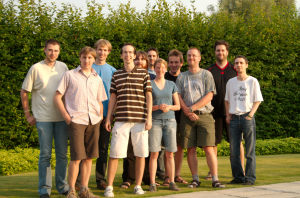
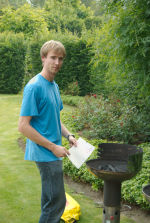
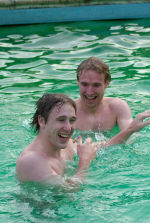
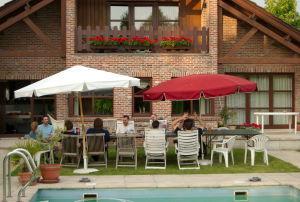
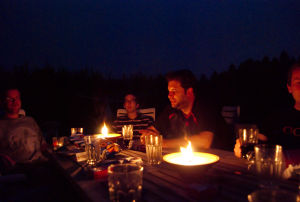
Ãœber FOSDEM
Mehr Informationen
Mailingliste: fosdem at lists.fosdem.org Dort werden Sie über die letzten Informationen auf dem laufenden gehalten.Öffentliches Wiki: http://wiki.fosdem.org
RSS-Feed: http://fosdem.org/rss.xml
Planet Aggregator: http://planet.fosdem.org
Was ist FOSDEM
FOSDEM ist eine freie und nicht kommerzielle Veranstaltung für die Community und durch die Community organisiert. Dessen Ziel ist es, Entwickler und Communities von freier und Open Source Software einen Treffpunkt zu geben um- mit anderen Entwicklern und Projekten in Kontakt zu kommen
- über die letzten Entwicklungen in der Welt der freien und Open Source Software informiert zu werden
- an interessanten Präsentationen und Sessions teilzunehmen, die in großen Hörsaalen stattinden und von Leitern und wichtigen Mitwirkenden von freien und Open Source Projekten in unterschiedlichen Themenbereichen gehalten werden
- die Entwicklung und die Vorteile von freien und Open Source Lösungen zu fördern
Letztes Jahr fanden in den Developer Rooms rund 140 Präsentationen statt, sowie in den "Main Tracks", die LPI-Prüfungen, Tutorial-Sessions sowie GPG/CAcert Key Signing.
Die Entstehungsgeschichte
Im Laufe des Jahres 2000 hat Raphaël Bauduin, ein Anhänger der Linux-Community in Belgien, entschieden eine kleine Veranstaltung für Open Source Entwickler zu organiseren. Er nannte es "Open Source Developers European Meeting" (OSDEM) und startete eine Mailing-Liste sowie eine kleine Website. Nur ein paar Wochen später tauchten viele Teilnehmer auf, gespannt auf ein aufregendes Event in Brüssel.
Raphaël schickte viele Einladungen an bekannte Persönlichkeiten der Open Source Szene: Rasterman, Fyodor, Jeremy Allison uvm. Alle gaben eine positive Rückmeldung, und OSDEM war auf dem Weg des Erfolgs.
Viele Jahre später ist OSDEM zur heutzutage allen bekannten Veranstalung "FOSDEM" herangewachsen.
Wir versuchen eine breites Spektrum an OpenSource-Projekten abzudecken und OpenSource-Entwicklern
und -Anhängern eine Plattform zur Zusammenarbeit anzubieten, im wahren Sinne der Freien Software.
Jedes Jahr begrüßen wir über 3500 Besucher auf dem Solbosch Campus der ULB, während des letzten Wochenendes im Februar.
Sponsors
FOSDEM would not be possible without the generous help of our sponsors.
They really get the Open Source spirit, and thus help us organizing the event year after year.
Thank you very much!
Cornerstone sponsors
O'Reilly | |
|
Once again, we are proud to have O'Reilly as one of our sponsors. They are the premier information source for leading-edge computer technologies and communicate the knowledge of experts through our books, conferences, and web sites. Their books, known for their animals on the covers, occupy a treasured place on the shelves of the developers building the next generation of software. Their conferences and summits bring innovators together to shape the revolutionary ideas that spark new industries. From the Internet to the web, Linux, Open Source, and now peer-to-peer networking, O'Reilly puts technologies on the map. |  |
Novell | |
|
Novell, Inc. delivers infrastructure software for the Open Enterprise. They are a leader in enterprise-wide operating systems based on Linux and open source and the security and systems management services required to operate mixed IT environments. They help their customers minimize cost, complexity and risk, allowing them to focus on innovation and growth. For more information, visit http://www.novell.com. With more than 35,000 registered members, the openSUSE project is a Novell-sponsored community initiative that promotes the use of Linux everywhere. For more information, visit http://www.opensuse.org. For more information about Novell's efforts in Free and OpenSource Software, please visit http://developer.novell.com/opensource/ as well as openSUSE.org. |  |
Main sponsors
(in alphabetical order)
Benesol | |
|
Belgian Network Solutions is the leading housing, colocation and IP transit provider in Belgium. Delivering services in the InterXion, LCL and MCI/Verizon facilities offering over 200 racks of space, fully meshed 10GigE DWDM rings and a fully redundant IP/MPLS infrastructure. Belgian Network Solutions is the partner for all your datacenter solutions. Benesol hosts our server infrastructure. |  |
Cisco | |
|
Cisco enables people to make powerful connections - whether in business, education, philanthropy, or creativity. Cisco hardware, software, and service offerings are used to create the Internet solutions that make networks possible - providing easy access to information anywhere, at any time. Cisco was founded in 1984 by a small group of computer scientists from Stanford University. Since the company's inception, Cisco engineers have been leaders in the development of Internet Protocol (IP)-based networking technologies. Today, with more than 67,000 employees worldwide, this tradition of innovation continues with industry-leading products and solutions in the company's core development areas of routing and switching, as well as in advanced technologies such as Application Networking, Data Center, Digital Media, IPICS, Mobility, Security, Storage Networking, TelePresence, Unified Communications, Video and Virtualization Cisco provides all of our WLAN hardware and helps us setting up the wireless network. |  |
Linux Magazine | |
|
Linux Magazine is the magazine for Advanced Linux Know-How. Based in the UK, Linux Magazine serves the international English-speaking Linux Community. Linux Magazine is also published in German, Polish, Portuguese, Romanian, and Spanish. Linux Magazine is donating international subscriptions during FOSDEM 2009. |  |
Linux Professional Institute (LPI) | |
|
The Linux Professional Institute (LPI) is an internationally recognized, vendor-independent organization advocating and assisting the professional use of Linux, Open Source and Free Software, through the certification of Linux professionals. Established as a non-profit organization in 1999, LPI is community based and supported. LPI's certification program is delivered worldwide in multiple languages at over 7,000 testing locations and is supported by an affiliate network spanning five continents. Since the programs inception, LPI has delivered over 155,000 exams and 47,000+ LPIC certifications around the world.
LPI's activities involve hundreds of volunteers and dedicated Linux professionals throughout the world in many different capacities, and the group encourages active public involvement through mailing lists and its website at www.lpi.org. LPI offers level 1, level 2 and level 3 certification exams with an almost 50% rebate to FOSDEM visitors and donates 10 EUR to FOSDEM per exam session taken during the event. |  |
Mozilla | |
|
The Mozilla Foundation is a non-profit organization that sponsors the Mozilla project and devotes its resources to promoting openness, innovation and opportunity on the Internet. The Mozilla foundation does this this by supporting the community of Mozilla contributors and by assisting others who are building technologies that benefit users around the world. |  |
Nokia | |
|
Nokia is a world leader in mobile communications, driving the growth and sustainability of the broader mobility industry. Nokia connects people to each other and the information that matters to them with easy-to-use and innovative products like mobile phones, devices and solutions for imaging, games, media and businesses. Nokia provides equipment, solutions and services for network operators and corporations. |  |
Q-layer | |
|
Q-layer provides software for data centers that enables true cloud computing. Cloud computing is rapidly changing the computing landscape – by turning data center infrastructure into an agile services delivery platform. New services such as virtual servers, storage or applications are available on-demand to both technical and non-technical users, with usage-based chargeback. By leveraging and augmenting existing data center infrastructures including all popular Hypervisors, Q-layer provides enterprises and service providers with the ability to deliver IT services simply and with dramatically lower TCO. |  |
Sun Microsystems | |
|
Sun Microsystems has held open systems to be the cornerstone of its philosophy since its beginning, and has always been dedicated to delivering hardware and software based on open industry standards. Today, Sun's commitment to Free Software is reflected in it being the single largest contributing organization, public or private, of software to FLOSS projects in the world.
For more information about Sun's efforts in FLOSS, please visit http://sun.com/opensource. |  |
|
| |
|
About Google:
Google's innovative search technologies connect millions of people around the world with information every day. Founded in 1998 by Stanford Ph.D. students Larry Page and Sergey Brin, Google today is a top web property in all major global markets. Google's targeted advertising program, which is the largest and fastest growing in the industry, provides businesses of all sizes with measurable results, while enhancing the overall web experience for users. Google is headquartered in Silicon Valley with offices throughout North America, Europe, and Asia. For more information, visit www.google.com. Google supports the event financially. |  |
Thanks
Cercle Informatique ULB | |
|
The "Cercle Informatique ULB" is a group of students who help us booking and using ULB rooms during FOSDEM.
| |
About FOSDEM
The ninth FOSDEM is a two-day event organized by volunteers to promote the widespread use of Free and Open Source software.
Taking place in the beautiful city of Brussels (Belgium), FOSDEM meetings are recognized as "The best Free Software and Open Source events in Europe".
More information
Mailing list: fosdem at lists.fosdem.org.
We will inform you when news about FOSDEM is available.
RSS feed: http://fosdem.org/rss.xml
Planet Aggregator: http://planet.fosdem.org/
What is FOSDEM
FOSDEM is a free and non-commercial event organized by the community for the community. The goal is to provide Free Software and Open Source developers and communities a place to meet to:
- get in touch with other developers and projects;
- be informed about the latest developments in the Free Software and Open Source world;
- attend interesting talks and presentations held in large conference rooms by Free Software and Open Source project leaders and committers on various topics; and
- to promote the development and the benefits of Free Software and Open Source solutions.
Participation and attendance is totally free, though the organization gratefully accepts donationals and sponsorships.
Developer Rooms
The FOSDEM team thinks it is very important for Free Software and Open Source developers around the world to be able to meet in "real life". To this end, we have set up Developer Rooms (DevRooms) with network/internet connectivity and projectors where development teams can meet and showcase their projects. DevRooms are a place for teams to discuss, hack and publicly present latest directions, lightning talks, news and discussions.
We believe developers can benefit a lot from these meetings.
Last year, there were more than 160 talks in the Developer Rooms in addition to the many main-track talks, the lightning talks and the LPI exams and the PGP/CAcert keysigning events.
Some history...
In 2000, Raphael Bauduin, a fan of the Linux movement in Belgium, decided to organize a small meeting for developers of Open Source software. He called it: Open Source Developers' European Meeting (OSDEM).
Raph created a mailing list, a small website and spread the word to people around him. Only a few weeks later, lots of people were waiting for an exciting event in Brussels!
Invitations were sent to well-known figures in the community: Rasterman, Fyodor, Jeremy Allison and so on. They all gave a very positive response and the OSDEM was on the road to success.
Many years later, OSDEM has grown to the event we now know as FOSDEM.
We now try to cover a wide spectrum of Open Source and Free Software projects, and offer a platform for people to collaborate in the true Open Source spirit. Every year, usually during the last weekend of February, we host around 4000 visitors at the ULB Solbosh campus.
Raphael is no longer the only one behind FOSDEM, after 7 years of hard work he left the team for new Open Source plans. A list of the entire staff can be seen here, together with some information on their involvement in the FOSDEM conference.
The Team
in alphabetical order- Alain Buret
- Christophe Vandeplas
- Dries Verachtert
- Elise Huard
- Floris Lambrechts
- Gerry Demaret
- Jan Gyselinck
- Jan Van Buggenhout
- Jan-Frederik Martens
- Jochen Maes
- Juan Rial
- Mark Van den Borre
- Mattias Guns
- Pascal Bleser
- Philip Paeps
- Philippe De Swert
- ...










